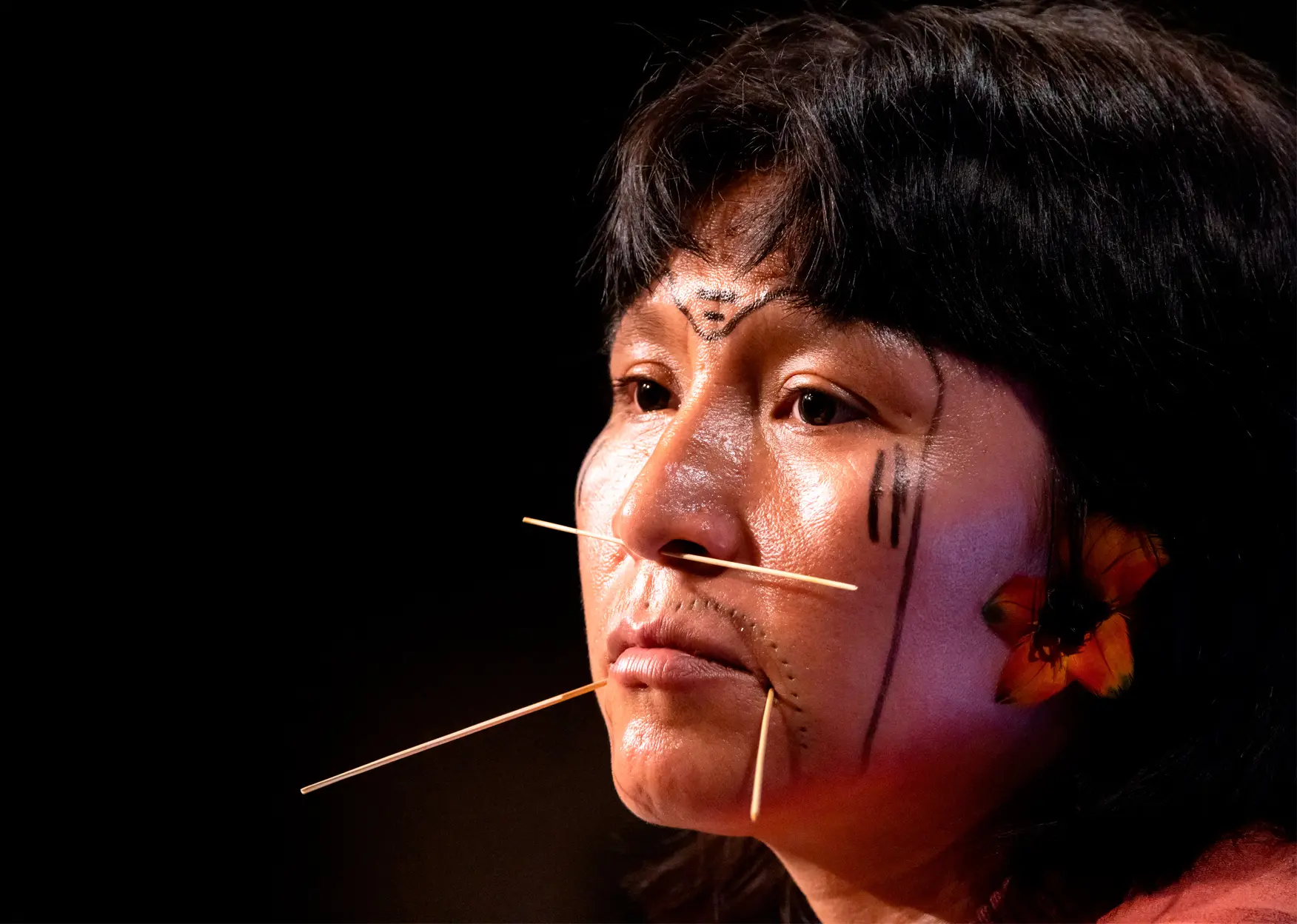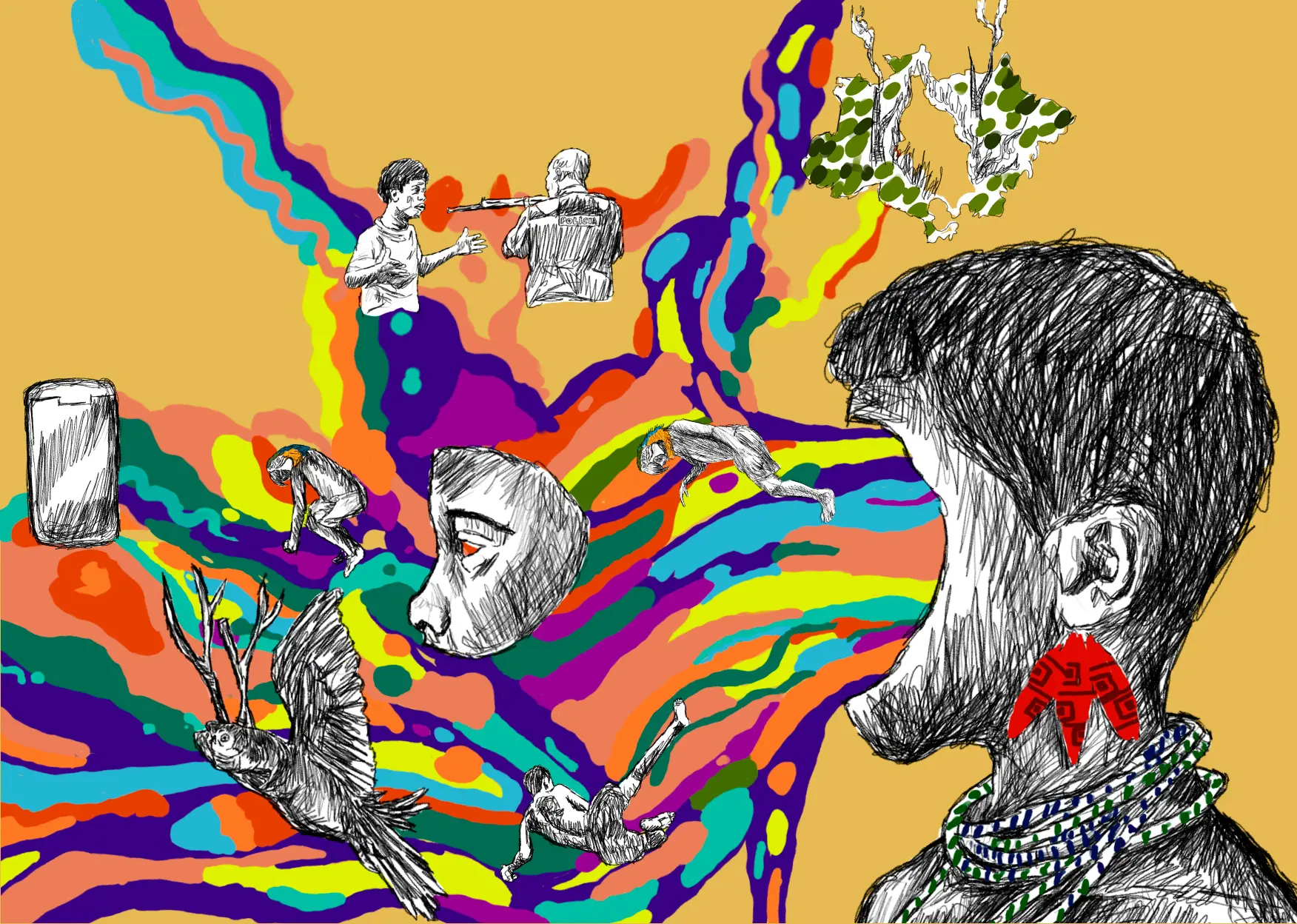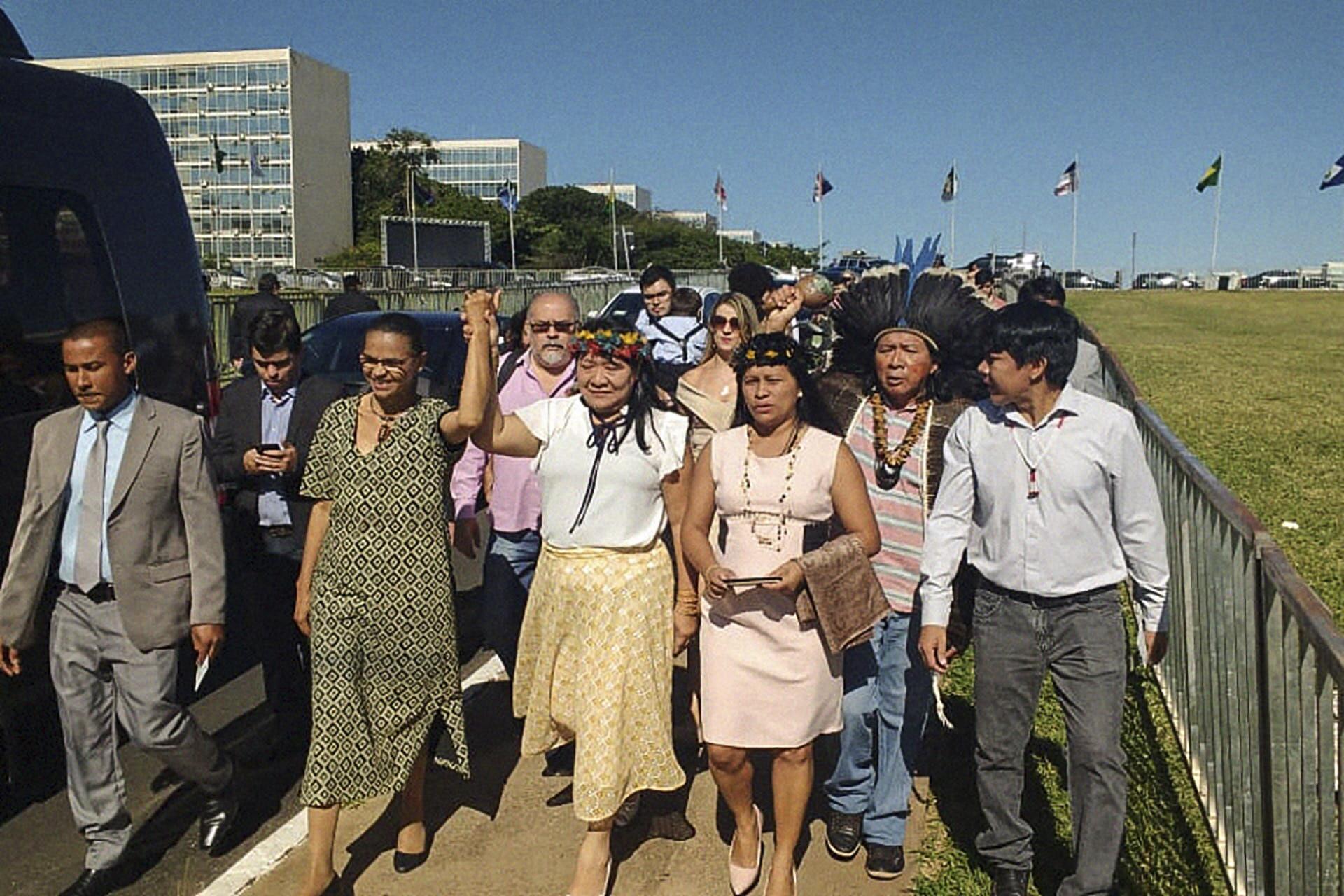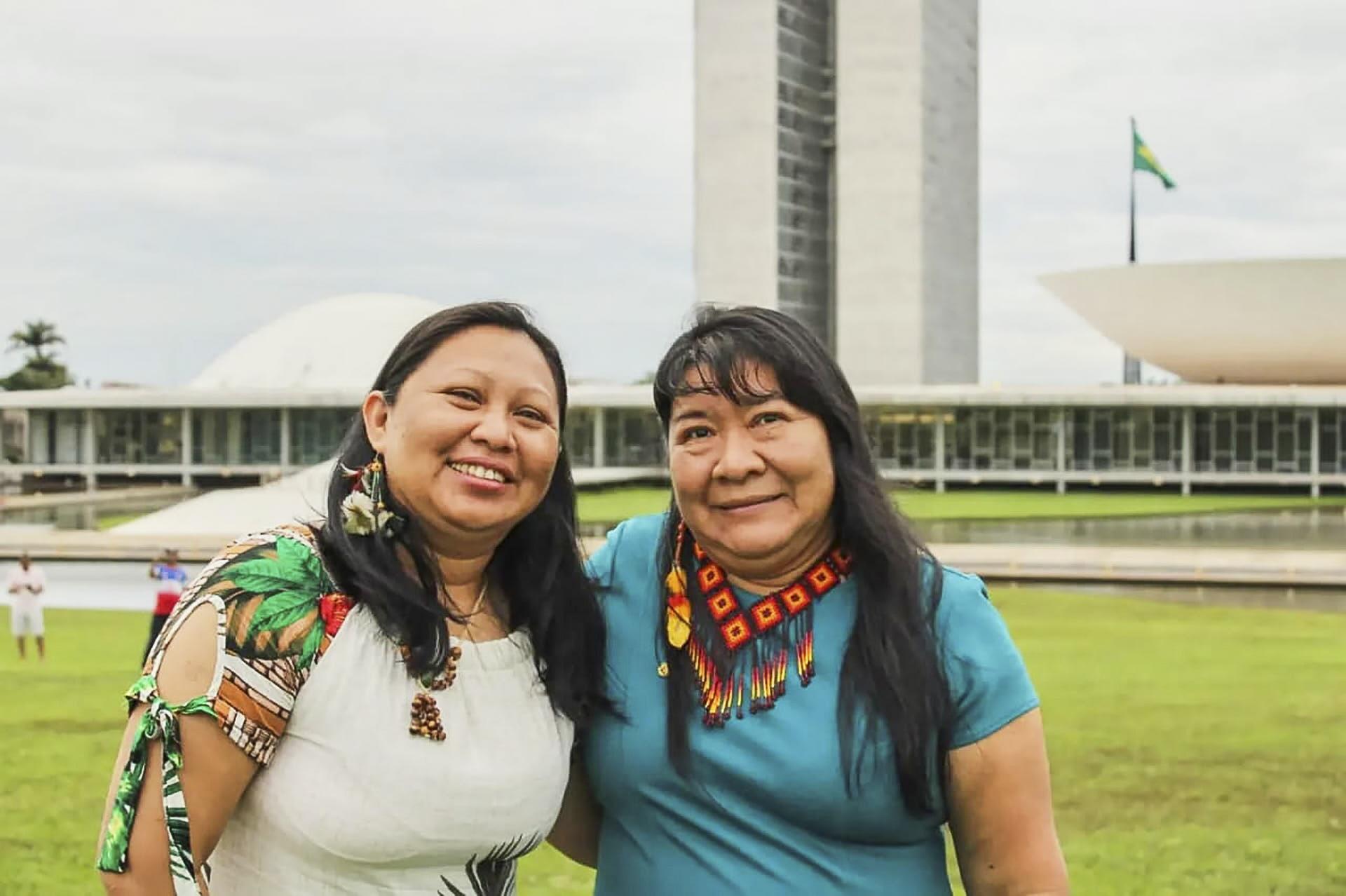On January 16, 2023, Joenia Wapichana had a private moment with us, her congressional team, on the shores of the sacred Caracaranã Lake in the Raposa Serra do Sol Indigenous Land, which is the site of the General Assembly of the Indigenous Peoples of Roraima. The chosen place and occasion were symbolic because it was there that, years ago, she had been approved to run in the 2018 elections. At that moment, the Indigenous Council of Roraima (CIR) was commemorating 50 years of intense struggle. And it was out of this struggle that Joenia Wapichana emerged as a leader at a time when the presence of women was still a rare thing.
With a trembling voice, full of emotion, Joenia began: “I have called you here because this is our last activity before my term of office comes to an end. I want to thank you for your work, for your dedication…”. The conversation lasted about 40 minutes and everyone spoke a little. We hugged each other, smiled, and then we said goodbye to a cycle that had marked lives and stories. We knew that the fight would carry on in other places. But the mandate of the first indigenous woman ever to become a federal deputy in Brazil ended there, in the land of our ancestors.
But how did it all begin?
The first time that the name of Joenia Wapichana popped up as a possibility was in the early hours of March 16, 2014. It was a night of discussions and deadlock during an indigenous assembly, and one of the leaders said: “Let’s nominate Dr. Joenia. Back then, she was coordinating the legal department of the Indigenous Council of Roraima and replied, “Who knows, maybe in 2018?” I got the impression that she spoke without any political foresight, but I didn’t forget.
In February 2017, her name was put forward once again at the Indigenous Assembly of the Serra da Lua region, with 23 communities from two of the State of Roraima’s municipalities, Bonfim and Cantá, and a population of more than 10,000 indigenous people belonging to the Wapichana and Macuxi peoples. Joenia accepted the nomination and so began the journey that would take her to the unprecedented mandate in the National Congress.
After Serra da Lua, there were other presentations in other regions, until her name was established. This nomination process should be applied in every social sphere: to launch candidates that actually come from the base, have legitimacy, and embrace collective instead of individual interests. When she was nominated, Joenia said: “I don’t have money, but I have all this body of work. From the middle [of the assembly], Mrs. Tereza Macuxi, from the Maturuca community, a woman with a forceful personality, said: “But Raposa Serra do Sol has [money]”. For us, resources for campaigning are not exactly money, but rather political, intellectual, cultural and organizational resources. That is what got Joenia elected, starting off with the 22 years of her life dedicated to work, commitment, and the indigenous cause. In the first half of 2017, she still wasn’t a member of any political party. Analyzing the whole political spectrum from left to right, we identified with the political party Sustainability Network.
Apart from being made up of defenders of indigenous, environmental and social causes, who are committed to political ideals that are consistent with what we are seeking, the Sustainability Network was founded by Marina Silva, the current Minister of the Environment and Climate Change. And Marina is the one who maintains our utopian ideals, the main political reference and the decisive reason for Joenia’s affiliation.
Politics with damurida
Joenia’s main opponent was the old political practice that, since childhood, had been instilled in us: “Relatives do not vote for relatives”. In our case, relative is the term used to refer to other indigenous people. For us it was clear that politics is in everything, in social, cultural, and economic relations. Back in 2017 getting that project off the ground was both a challenge and an opportunity to construct our own, legitimate and original format, that could distance itself from the old models and vices that are ingrained right up until the present time.
To construct this, in response to Joenia’s call, we began to hold collective breakfasts at her house. Each of us brought something to eat, but there always had to be damurida (a typical food based on boiled fish and pepper) which is eaten with flour or beiju (tapioca pancakes), made by Evilene Tomaz, from the Patamona people. At one of these damurida meetings, Joenia asked us: “So, people, do I accept the nomination or not? And we answered, “Yes. And we will be together.” We gathered volunteers and assembled support groups. And in this way, we were able to get our candidate’s campaign for federal representative onto the streets, into the communities and throughout the state.
In January 2019, we arrived in Brasília. Blessed by the ancestors, we were welcomed in the Pajés Sanctuary, an indigenous territory in the Northwest Sector of the federal capital where they maintain the dwelling of the leader and shaman Santxiê Tapuya (in memoriam), who always fought against real estate expansion and in favor of preserving this original place of the indigenous peoples. It is a place for prayer, for connecting with one’s ancestors, with nature and for cultural manifestations. And we used to meet up there with indigenous relatives on weekends to soothe our feelings of nostalgia and, of course, to eat damurida.
A few minutes or 500 years?
Joenia Wapichana’s mandate was different from that of non-Indigenous people, in everything from the decision to run for office to the way she operated. In her speeches in congress, Joenia used to say: “I am here because of a decision made by the assembly, not by me. I wasn’t the one who decided to enter politics, it was the indigenous communities who nominated me. It was the result of a collective decision rather than an individual one.”
On February 1, 2019, the day of her inauguration, I saw her arriving at the National Congress. Around eight in the morning, a small, representative group began to gather on Rua das Bandeiras. While the other congressmen came past in luxury cars, Joenia’s supporters – indigenous leaders and friends – followed along with the people.
We walked down the ramp of the Congress’ cloakroom chanting traditional songs. We walked alongside the congresswoman, who was very emotional – she, who on the outside is very strong, or needs to be. I was also crying. The walk only took a few minutes, but it took more than five centuries of struggle in order to make it possible for her to take these steps into congress.
The national and international press reported the inauguration. On the floor of the congress, Joenia vowed to defend the Constitution and Indigenous rights. I felt especially honored because that day she wore my headdress – an ornament for important moments, celebrations, and acts of defense of collective causes. Since then, I have only worn it a few times. It will be kept for the memory of this cycle, as a symbol of struggle, resistance, and conquest in congress.
It should be pointed out that Joenia never walked alone. Right at the very outset of her term in office, the congresswoman set up the Mandate Council, made up of indigenous and non-indigenous friends and partners, to come up with ideas, proposals, and information that would contribute to her work in the National Congress. This idea was a very important and successful one. Whenever a controversial agenda appeared, one of Bolsonaro’s anti-indigenous projects or other acts of the Executive Branch, she would call a meeting to analyze and propose courses of action. Ninety-three people took part in this group – including anthropologists and lawyers, socio-environmental defenders, representatives of indigenous organizations, indigenous experts and environmentalists. This structure will continue and will, undoubtedly, be very useful for the work of Funai’s first female president.
Office 231
For her office Joenia chose the number 231, which is the same one as the article in the Constitution that deals with indigenous rights. It worked. The place became a reference on the second floor of annex 5 of the House of Representatives and received indigenous people from all over Brazil who came to present their demands, make visits, meet, and talk.
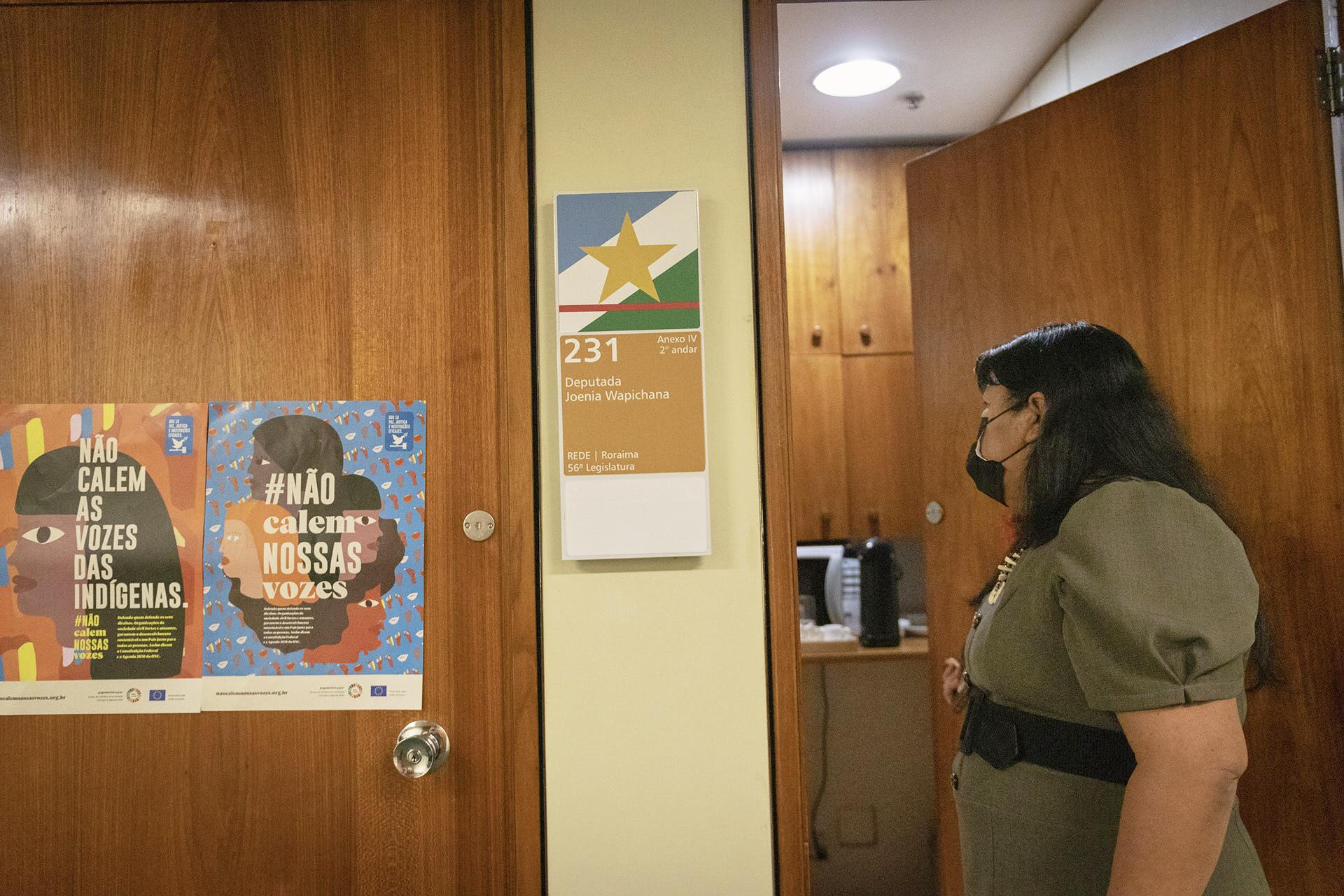
For her office Joenia Wapichana (2019-2022) chose the number 231, which is the same one as the article in the Constitution that deals with indigenous rights. Photo: Webert da Cruz/UN Women
In the second week of her mandate, the first group that arrived consisted of representatives from the Guarani Mbyá and Xokleng peoples, from the municipality of Palhoça, in the State of Santa Catarina. They went to Brasília because of the demarcation process of the Morro dos Cavalos Indigenous Land, in the Federal Supreme Court, and were looking for support. We had been expecting ten leaders, but when we saw there were 30, there was not enough room for everyone, either in the office or in the congresswoman’s meeting room. Only at that moment did we find out that Joenia was entitled to a meeting room with the necessary structure, with coffee and water for all those who had come from afar. It was our debut event.
The first time I had heard of the “lady lawyer for the indigenous people” was in the early 2000s, during the struggle for the demarcation of the Raposa Serra do Sol Indigenous Land. But only years later did I find myself working with Joenia on the Indigenous Council of Roraima, and at that point had not even begun to dream that one day I would be witness to a historic moment. More than that, I would be an advisor to Brazil’s first female indigenous federal deputy.
Many times, I choked down tears as I accompanied indigenous groups to meetings. I witnessed the happy and sad emotions of relatives. Of the 513 deputies, Joenia was the only indigenous voice that could make itself be heard in the rostrum. And that was where she went to register complaints of many violations. And this was the case with a 12-year-old girl, who had been raped and killed, which was reported by the Yanomami Indigenous Health District Council (Condisi/Yanomami). She said, “Once again today the newspapers are printing news of terror that is happening to indigenous peoples. Not in the Ukraine or in Russia, but here in Brazil”.
Mission: to stop Bolsonaro’s evil deeds
One of the first achievements of Joenia Wapichana’s mandate in Congress was the setting up of the Mixed Parliamentary Front in Defense of the Rights of Indigenous Peoples, which was made up of 237 members of congress (27 senators and 210 deputies). It wasn’t easy for a new group like ours to go out into the corridors and get at least 170 signatures. But we did it.
The Front was launched in April 2019 in the Black Room of the Lower House, in an act which was at the same time both tense and amazing, with senators, federal deputies, people from civil society and indigenous organizations. It was the first event that was organized from office 231.
The first notable victory that this parliamentary front achieved was to get Provisional Measure 870 shelved. Right from the start, Bolsonaro’s government had intended to transfer Funai from the Ministry of Justice to the Ministry of Women, Family and Human Rights and transfer the attribution of demarcation of indigenous lands to the Ministry of Agriculture. There was a major confrontation both in the House and in the Senate, but the pressure, the strategies and the mobilization of the indigenous peoples, indigenous experts and supporters made the difference and the Constitution came out victorious. Bolsonaro continued with his attack and shortly afterwards came up with Bill 191, which would authorize mining on indigenous lands. It too was shelved.
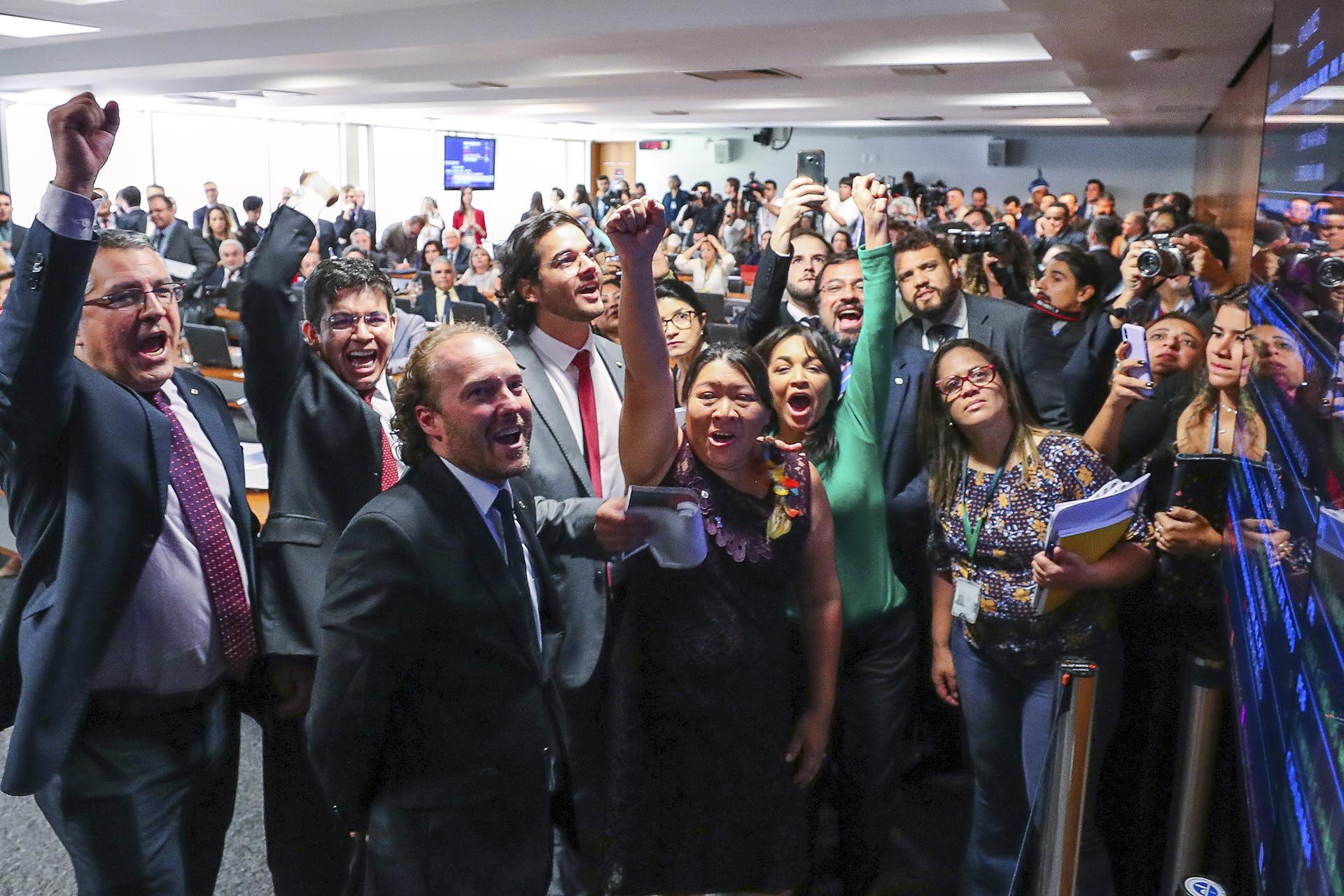
One of the first achievements of the Mixed Parliamentary Front in Defense of the Rights of Indigenous Peoples was to get Provisional Measure 870 shelved. Bolsonaro’s government intended to transfer Funai from the Ministry of Justice to the Ministry of Women, Family and Human Rights and transfer the attribution of demarcation of indigenous lands to the Ministry of Agriculture. Photo: Mídia Ninja
Wapichana diplomacy
Joenia’s presence contributed to the fact that up until the end of her mandate Bolsonaro’s assaults were blocked. We were alert and, in the most dramatic moments, the federal deputy used what she usually calls “Wapichana diplomacy”. She used this term to refer to – and still uses it – for confronting opponents and thorny issues with a firm calmness – always moving forward, but without ever losing her cool.
As the only indigenous deputy and the only member of the political party Sustainability Network in the House, the former congresswoman would start off her day at nine in the morning and finish at midnight. Whenever necessary, she would carry on until two or three in the morning. Joenia always complied with the legislative agenda in the committees and in the full sessions of the House. There was no one to take her place, particularly when it was a question of voting on proposals and reforms. She also attended meetings in her office, virtual events, and gave a lot of interviews.
For me attending and mediating interviews was one of the most rewarding assignments of Joenia’s mandate, because at the same time as I was doing my job, I was also learning a lot. When the agenda was about indigenous representation in the National Congress, one of the federal deputy’s most frequent phrases was: “I may be the first indigenous female federal deputy in Brazil, but I don’t want to be the only one or the last one. And this became a reality in the 2022 elections, with the election of three indigenous women in alignment with the cause: Sonia Guajajara (Socialism and Liberal Party, for the State of Sao Paulo), Célia Xakriabá (Socialism and Liberal Party, for the State of Minas Gerais) and Juliana Cardoso (Workers Party, for the State of Sao Paulo). The only one I still don’t know personally is Juliana.
In Brasília, during the Covid-19 pandemic
Cooped up in an apartment, I followed the pandemic situation in the State of Roraima and in the rest of Brazil. I worked from home out of care not to contract the coronavirus, the fear for my loved ones, and the deaths of people close to me. There were more than thirty letters of condolence in the space of a few months, weeks, days. The first death was that of the teacher Fausto Mandulão, of the Macuxi people, who lived in the Tabalascada indigenous community. A leader, the teacher was a pioneer in the fight for a specific differentiated indigenous school education.
Then came other deaths, like that of Marcos Braga, a professor and director of the Insikiran Institute for Indigenous Higher Education at the Federal University of Roraima, one of the biggest supporters of Joenia’s mandate. We were left like orphans: without charisma, joy, friendship, and struggle. But the losses didn’t end there, there were others like that of the famous grandmother Bernaldina, of the Macuxi people, from Maturuca, an elder and holder of traditional knowledge.
In addition to family support and comfort, the mandate needed to help the people who felt that they had been abandoned and that the lack of assistance was increasing. The net was closing on the indigenous people. The federal deputy then called on public institutions and partner organizations to take urgent action. A number of virtual meetings were held to try and speed up and make the bodies responsible, such as the Secretary of Indigenous Health and the Ministry of Health, act quickly.
In light of the government’s deliberate delays, we began a race to draft and approve Bill no. 1,142/20, submitted by Congresswoman Rosa Neide (Workers Party, for the State of Mato Grosso do Sul) with Joenia Wapichana as rapporteur. The project guaranteed an Emergency Plan for tackling Covid-19 for indigenous and traditional peoples, seeking to ensure access to drinking water, distribution of basic food parcels, hygiene and cleaning materials – basic survival items. After being approved, the Bill was sent for presidential sanction. Jair Bolsonaro vetoed 22 items, including the most essential one of all, drinking water.
The vetoes generated outrage and once again Bolsonaro was defeated. The response came in the form of approval of the proposed law. Law 14.021 was created. In July 8, 2020’s virtual session, the federal deputy used the political party Sustainability Network’s leadership time, in the virtual plenary, to express her indignation with the far-right politician’s vetoes: “Ladies and gentlemen, the president even removed from the Bill’s text mandatory access to drinking water. This is really serious. We are dealing with human beings, with people who have their rights protected by the Constitution, just like the rest of Brazilians. We have our cultural, geographical, and ethnic differences, but first and foremost there is a need to respond to this emergency situation. This is not an ideological situation, nor is it the responsibility of one party. It’s not about left or right. It’s about protecting lives.”
“I’m sorry, but I’m not the congresswoman”.
In the four years that she was in the National Congress, Joenia Wapichana’s performance was recognized by the Congress in Focus award, which is promoted by the news website that has been following the daily lives of members of congress in Brasilia since 2006. At the first award ceremony, there was an amusing mix-up: I got out of the Uber car dressed in red and I soon saw a number of photographers approaching me: “A picture, please congresswoman”. This was despite the fact that I was missing the traditional Joenia fringe. Somewhat embarrassed, I had to keep on repeating: “Sorry, but I am not the congresswoman”.
This mix-up occurred several times. I always thought the environment was not used to the presence of indigenous people and only at that moment did they begin to recognize our existence. Our perception in congress was that the majority either thought that there were no more indigenous people or that everyone was the same. The fixed image they had in their heads was that from 1500, in the forest and wearing loincloths. They didn’t see us dressed up and in the House of Representatives, as members of congress and civil servants. I believe we did our part to make our existence more visible and also to educate non-indigenous people.
“Your elevator is that one over there,” the elevator operator pointed out
Joenia likes to recount an experience she had in the private elevator, reserved for members of congress. One day, she was approached by the elevator operator, who pointed to the visitors’ elevator: “Yours is that one”. Joenia showed the woman her congresswoman’s pin, but the lady wouldn’t look at her, and kept on saying that the elevator she should use was the public one. Joenia insisted, until the woman finally noticed the pin.
The elevator operator then said, “I’m sorry, congresswoman. It’s just that usually only men walk here. Joenia replied: “You are sexist. The lady elevator operator answered: “No, congresswoman. It’s just that women usually wear heels and blazers”. Joenia, always sharp, retorted: “Wow, you are class-based”. But the elevator operator couldn’t accept this: “Only people who look like us walk here. Dismayed, the deputy reaffirmed: “You are a racist”.
A little food for each child
Joenia Wapichana worked tirelessly on the distribution and inspection of amendments and resources during her mandate. Her delegation in Roraima received the requests, made the analysis, and a collective decision was made, based on the debate with indigenous leaders, public institutions, and other agents. She used to say “dividing the resources is like a mother who divides up the food so there’s a little bit for each child”.
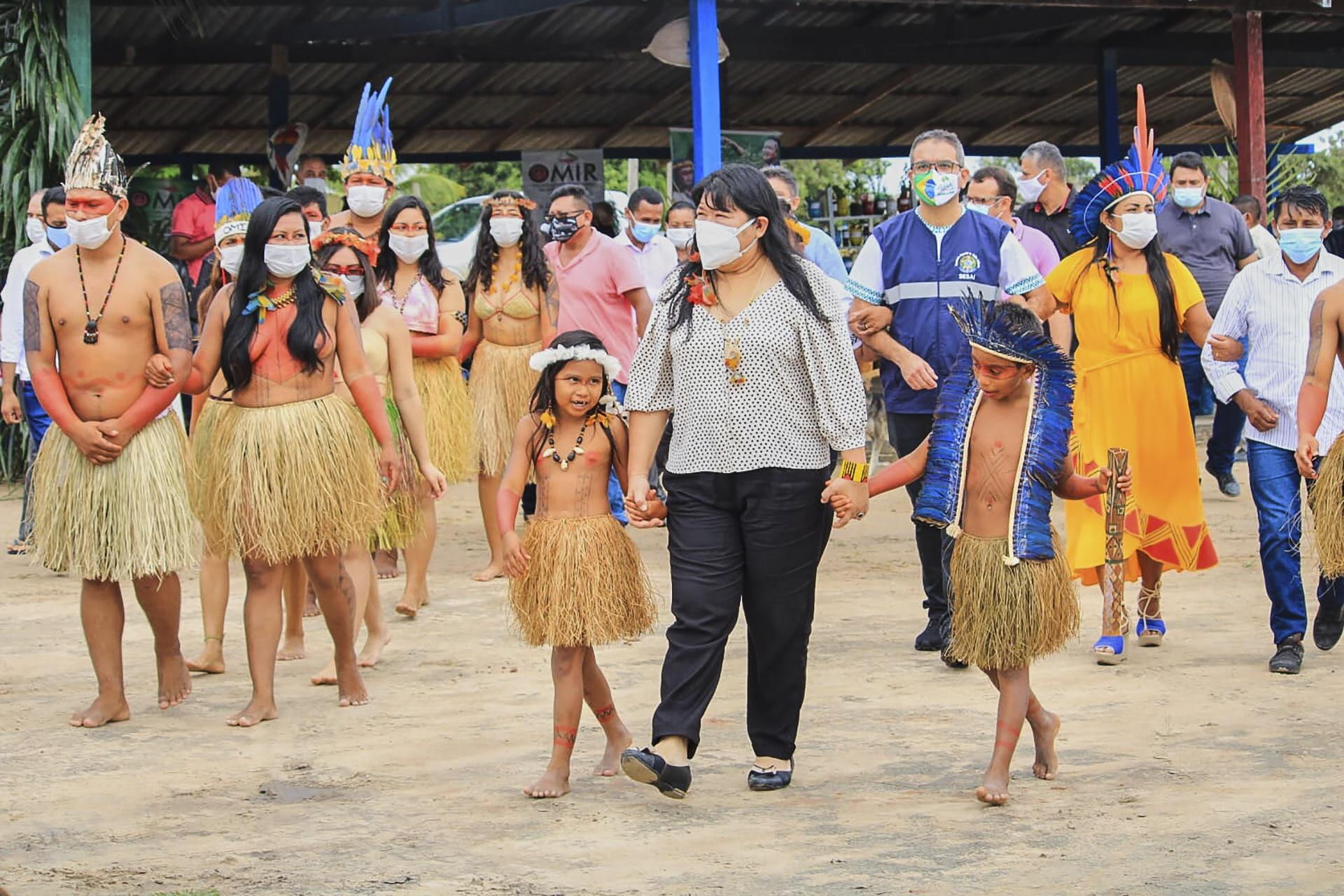
Inauguration of the Basic Health Unit (BHU) in the Campinho community (Canauanim Indigenous Land), state of Roraima. The UBS was built from a parliamentary amendment presented by Joenia. Photo: Lohana Chaves
In August 2021, the inauguration of the first Basic Health Unit (BHU) in the indigenous community of Campinho, in the Canauanim Indigenous Land, showed it is possible to have members of congress who are committed to public policies and who identify with the population. The image of the children welcoming Joenia and holding her hands, as well as the emotion in the people’s smiles and in their eyes, reminded me of my childhood. But in reverse. When I was a girl, instead of receiving indigenous representatives, my people used to receive politicians who were not committed and who were anti-indigenous.
At last, this reality has been shattered. Joenia was our example of change and was welcomed with the parixara (traditional dance), the songs, the smoking of maruwai (the resin used by the shamans for protection) and a great deal of joy.
After Brasília, the return to the cruviana
I had left my indigenous community in Malacacheta, which is 37 kilometers from the capital of Roraima, Boa Vista, when I was 14. I went to live in Maloca Grande[M2] . After years overcoming the challenges of urban life during my school days, I was able to take part in a congressional mandate and had the opportunity to make a home in Brasilia. In 2022, because of the elections, I left the corridors of the House of Representatives and the federal capital to be close to the cruviana – the strong wind at dawn – and to the tilled land of the State of Roraima, our unique ecosystem, of open vegetation which is important for the conservation of our biodiversity. Once again, I was close to indigenous relatives, friends and supporters of the cause because, once again, it was election time.
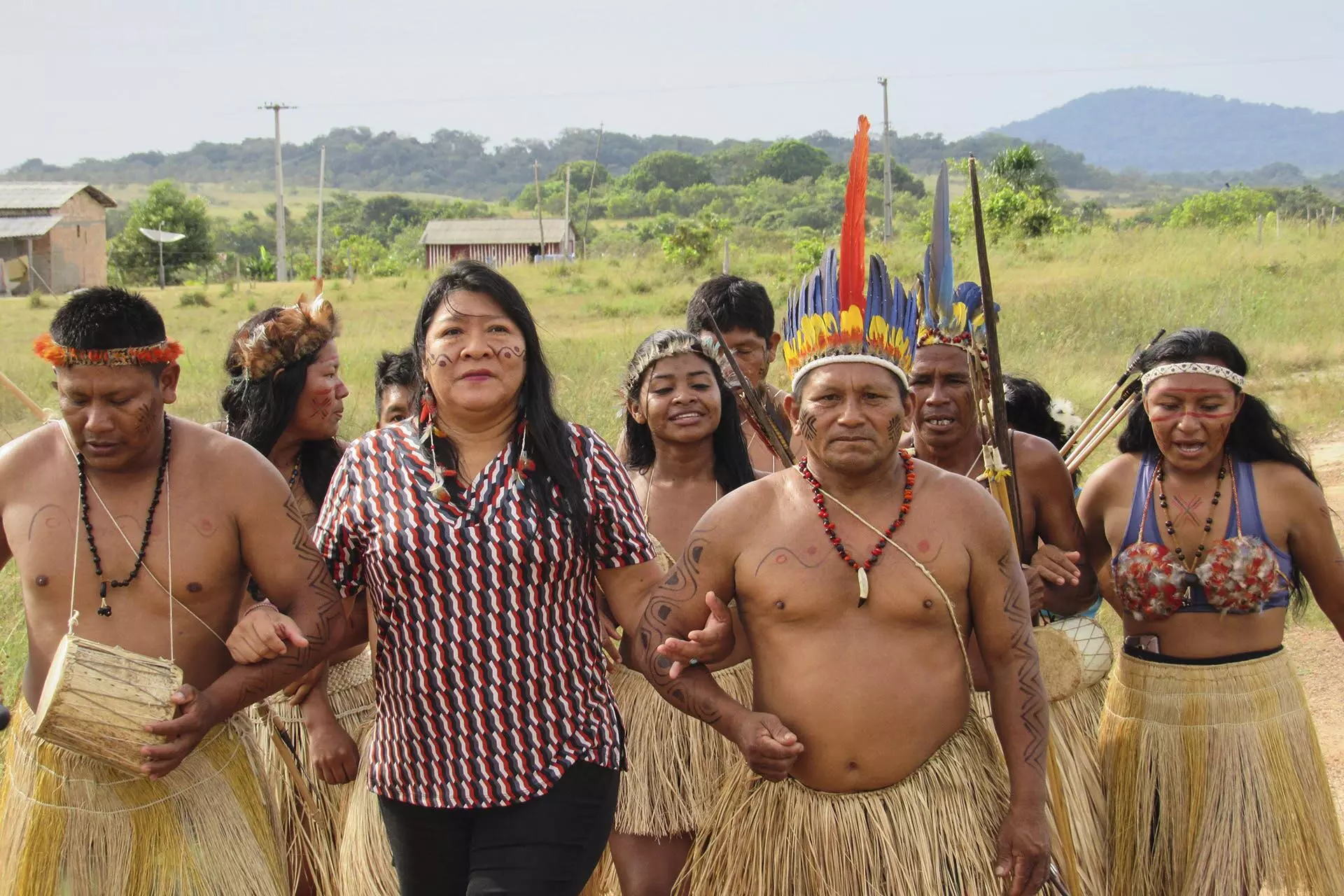
Indigenous people welcome the future deputy Joenia Wapichana in a community near the city of Amajari, Roraima state, in 2018. Photo: Mayra Wapichana
The population of 79 thousand people in Roraima includes ten peoples, among them the uncontacted communities who live on the Pirititi Indigenous Land, which is still in the process of getting its legal status sorted out. But Roraima is also pro-Bolsonaro. In the 2022 elections, Bolsonaro was the victor in 14 out of the 15 municipalities and got 76% of the votes, the highest percentage he got in any Brazilian state. This favored the election and reelection of a lot of his allies, including the Governor Antonio Denarium. Only Uiramutã, in the Raposa Serra do Sol Indigenous Land, voted for Luiz Inácio Lula da Silva.
There were 45 days of intense work, but we did not obtain the necessary electoral percentage. In 2018, Joenia got 8,491 votes. In 2022, 11,221. This reflects a clean, fair election, without alignment to politicians with a history of corruption and anti-indigenous and anti-democratic positions. But the outcome did not mean the end. On the contrary. Electoral processes come and go, but political practices carry on. The ones who suffer the most from the exercise of politics without commitment are the indigenous communities and the population that does not have access to information and education.
In her last speech from the rostrum of the House of Representatives, on December 21, 2022, she said: “This is not a farewell, but rather a ‘see you soon’, because the fight goes on”. And indeed, it has, as she has become the first indigenous female president of the National Foundation of Indigenous Peoples. Once again, Joenia Wapichana does not walk alone.
*Mayra Wapichana has a degree in journalism from the Federal University of Roraima. She was a communications advisor for the Indigenous Council of Roraima as well as for the country’s first indigenous federal deputy, Joenia Wapichana (2019-2022), who is now the president of Funai (the National Foundation of Indigenous Peoples). She is part of the indigenous movement’s struggle in the forest and in Brazil, at assemblies and cultural, social and political mobilizations.
Spell check (Portuguese): Elvira Gago
Translation into Spanish: Meritxell Almarza
English translation: Mark Murray
Photography editing: Marcelo Aguilar, Mariana Greif and Pablo Albarenga

